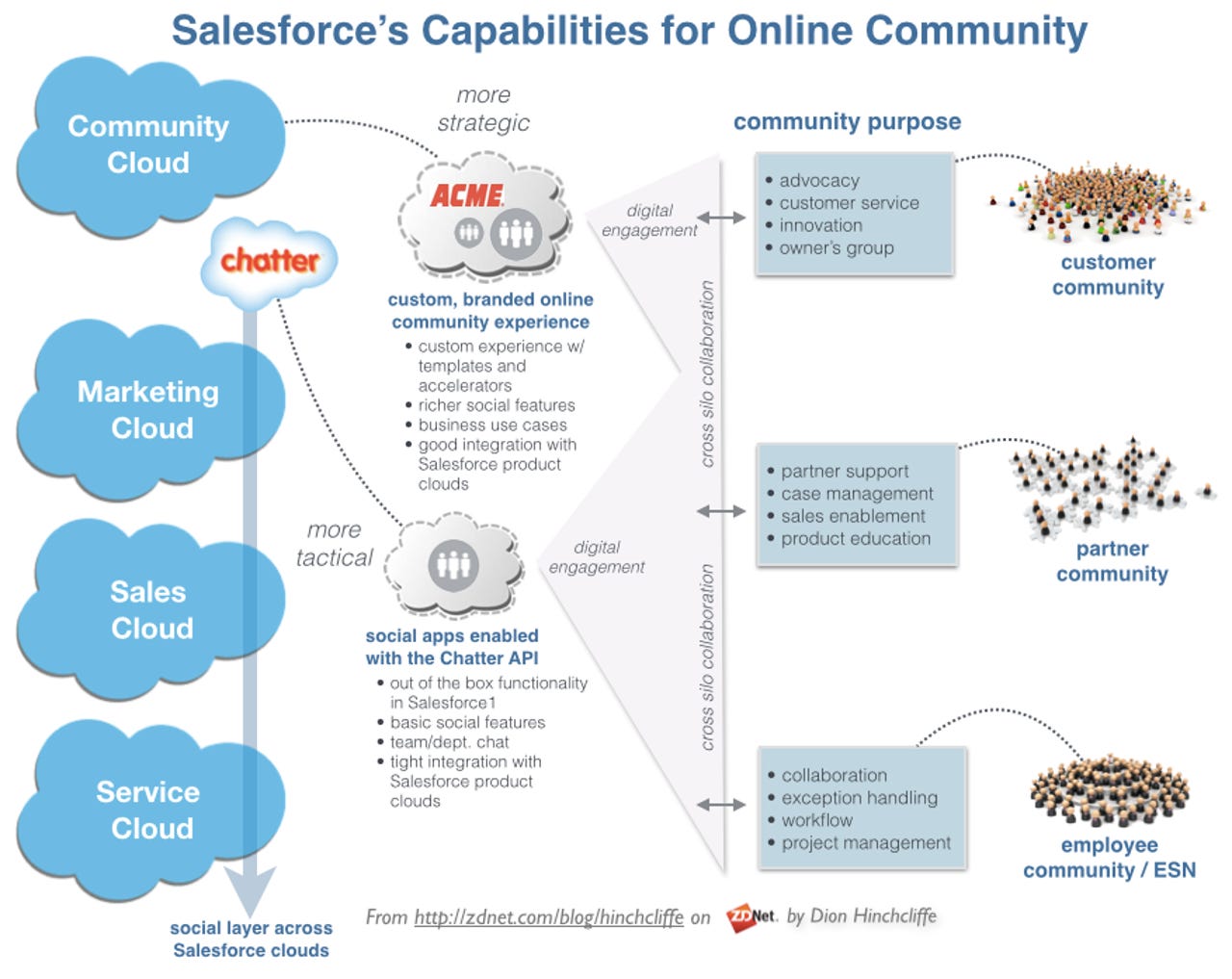Exploring Salesforce's move into online community

Once almost exclusively the domain of open source platforms like Drupal and Joomla, the platforms for online community have evolved and matured significantly over the years in the technologies they use, the features now considered standard, and the organizations that actively provide them. As I've explored in this column for nearly a decade, businesses are increasingly employing digital communities to keep stakeholders closer, co-create with them, all while getting vital work accomplished in a far more scalable and cost-effective way than they could before.
But communities aren't really rocket science from a technology perspective -- not coincidentally it's the human aspect of them that's typically the most challenging -- and so the enterprise community software market has steadily entered the early phases maturity, even if many new players continue to emerge on the margins.
Now, however, after years of a relatively steady state, a well-known industry player, Salesforce, has begun shaking up the status quo after an earlier attempt a half-decade ago with its more moderately positioned Chatter platform.

Online communities need an effective platform
Since the heady early adoption days when few people were sure there were strategic outcomes possible with digital communities -- much less that they'd become central to how we engage with our various stakeholders and create shared value within and between our organizations -- one point has remained clear: A good community platform can contribute to success, while a great platform can help define it.
Online communities, as their needs matured, gradually shifted from open source offerings to commercial SaaS platforms like Lithium and Jive as enterprises began investing in social engagement in earnest. More sophisticated than the early, largely enthusiast consumer communities, enterprises communities required more advanced features such as support for specific business use cases like commerce or customer care, the ability to support operation in multiple geographies, automation of routine administration work, a high quality business-class responsive user experience, governance capabilities, and other standard requirements of enterprise IT such as support and maintenance.
For its part, Salesforce -- almost completely ascendant in the CRM space and rapidly expanding its SaaS product lines to cover nearly everything businesses need to do with digital today from analytics to IoT -- has long shown consistent interest at a leadership level in incorporating contemporary social business capabilities into its product lines. Over the years, Salesforce's CEO Marc Benioff has frequently promoted his vision that stakeholder engagement using social media capabilities is vital for business, with varying degrees of success.
Enter the ambitious Community Cloud
Over the last year the company has doubled down on social business in a substantial way. Specifically, it's Salesforce's latest offering in the social business space, dubbed Community Cloud and launched last year with decidedly less fanfare than Chatter, that is arguably the most significant move into enterprise social media the company has made so far.
While Chatter was effective at providing basic social features within Salesforce's many products, it wasn't sufficient as a fully branded and independent online community platform that could be the primary social experience for an organization for its customers, business partners, and employees.
Instead, Community Cloud is a much more ambitious move by Salesforce to realize online community as a strategic capability for enterprises that seek to engage more deeply and effectively with the various key actors they must work with to succeed as an organization.
The value proposition is clear: While a growing body of data shows significant benefits across the board for social business, it is digital customer experience in particular that has shown to be both the toughest challenge and the route to the most benefits, including high impact to customer satisfaction, competitive positioning, and profitability. Best-in-class customer experience is also tied to directly to high revenue growth in numerous studies, and online community is a foundational touchpoint for highly engaging customer relationships.
Thus Community Cloud is positioned, especially with Salesforce's vast customer base, to be a primary player in online community over the next few years, given the company's ability to execute and far-ranging vision as a customer-centric SaaS company. Here are key points to consider for organizations using communities today:
- Early uptake of Community Cloud has been impressive. A whopping 36% of all new customers acquiring Sales Cloud, Service Cloud, or Marketing Cloud from Salesforce are also opting to add Community Cloud according to Dow Brook Advisory's Larry Hawes. With Salesforce's vast presence in the market and this kind of lift, the company is in a position to rapidly turn Community Cloud into a market leader in a relatively short time. Particularly given that Salesforce has a good track record of sticking with products, enterprises looking to avoid the stability and longevity concerns of smaller players will find the company's product backing and well-known performance with one of the longest track records in SaaS fairly compelling.
- A focus on useful business use cases enabled directly within Community Cloud. Salesforce recently partnered with vendors including Demandware, CloudCraze and Bigcommerce to bring capabilities like integrated shopping and e-commerce into Community Cloud. As communities mature to be the vehicle to best accomplish high value business use cases including customer care, product development, partner support, and sales enablement -- to name just a few -- Salesforce appears likely to ensure these feature sets are available in Community Cloud to support them.
- Streamlining the online community adoption process. Salesforce is also actively focusing on reducing the time it takes to design and launch communities. Collapsing the time between the start of the community development process and the creation of initial business value is a stated goal. The company is achieving this using easy-to-deploy and configure community templates and accelerator tools. A good example of this is the Napili support community template in the Winter '15 release, aimed at getting an effective customer support community launched with best practices in the shortest amount of time and effort. Salesforce also has numerous partners that are building solutions on Community Cloud as well, another benefit of the company's large and experienced partner ecosystem. These partners are expected to add many additional business use cases and functions to the Community Cloud platform.
Community Cloud sets itself apart in another key way as well: While leading social software suppliers such as IBM and Microsoft have focused mostly on delivering enterprise-class internal social capabilities, Salesforce has positioned itself well to become the market leader on both internal and external social.
In particular, it's Community Cloud's agnostic and seamless view of stakeholders (customer, business partner, and employee) that will give it enormous versatility and utility for enterprises, as one of the more interesting aspect of social up until now is that it's been fragmented across key functions in most organizations, with marketing and customer care owning external social channels, and IT and HR owning the internally facing social in most organizations, with 96% of such efforts not connected together into a consistent experience. In fact, Community Cloud is one of the few enterprise offering that has the genuine potential to unify social business in organizations onto a single, consistent platform.
Consequently, online community practitioners should watch the evolution of Salesforce's new community platform closely, as Community Cloud's fast start out of the gate and backing by the world's leading SaaS company is likely to put it on the short list of organizations going forward as they add communities to their customer experience strategies or migrate off of older, aging community platforms.
Additional Reading
Salesforce.com adds more predictive tools to Marketing Cloud
The major enterprise collaboration platforms and their mobile clients
Redesigned Google+ emphasizes Collections, Communities features